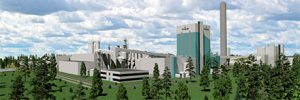In December 2019, the Supreme Administrative Court (KHO) of Finland rejected the environmental permit for the Finnpulp bioproduct mill in Kuopio. The decision came after a vote with two members in favour of awarding environmental permit. The decision is final and is not subject to an appeal. Source: Timberbiz
“This marks the end of the current mill project, which is a great loss for Finland,” Niilo Pellonmaa, Chairman of the Board of Finnpulp said.
Finnpulp questions the grounds for the decision. The project has been prepared with the best expertise in the world, including leading consultants in the forest industry, such as Pöyry.
“We have provided all necessary and requested material to the authorities and courts during the permit process. Therefore, the statement in the decision that Finnpulp has not provided sufficient studies is incomprehensible,” Martti Fredrikson, Managing Director of Finnpulp said.
He further points out that according to the decision, Finnpulp should have comprehensively assessed the impact also of all other pollutants on Kallavesi throughout the mill’s estimated economic life cycle (40–50 years).
“This is a requirement that no industrial mill can meet. No such studies have been required neither during this process nor in previous pulp and paper projects,” he said.
According to Mr Fredrikson, the decision of the KHO is in complete contradiction with previous positive decisions of the Regional State Administrative Agency and Vaasa Administrative Court.
Finnpulp’s environmental permit process lasted almost five years. The company started an environmental impact assessment in spring 2015 and the permit was granted by the Regional State Administrative Agency for Eastern Finland in March 2017. The permit was appealed to Vaasa Administrative Court, a court specializing in environmental matters. The decision of the Vaasa Administrative Court in 2018 was appealed to the Supreme Administrative Court.
According to Niilo Pellonmaa, the decision of the KHO is a serious message internationally: “According to this decision, the Finnish investment environment is not attractive to international investors. There was a lot of interest towards the Finnpulp project worldwide, and we already succeeded in having a significant international investor in the project. Understandably, investors value stability and predictability when considering investments. Five years of uncertainty for international investors and for major new projects in general, is far too long,” Mr Pellonmaa said.
The investment cost estimate for the Finnpulp bioproduct mill was EUR 1.6 billion.






